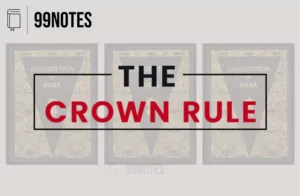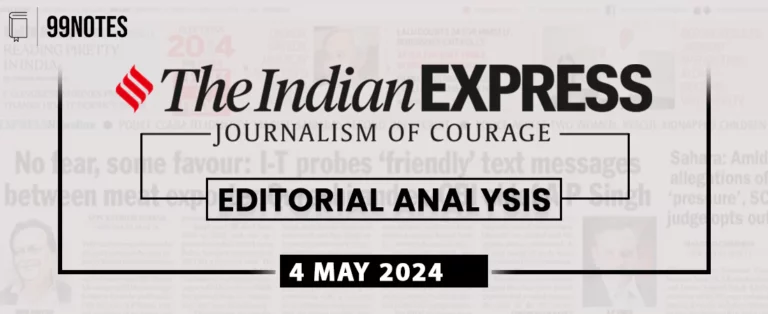20 September 2023 : Indian Express
Indian Express
20-September-2023
The Indian Express, CSE candidates can stay informed about current events and developments in India and around the world.
1) Women’s Reservation Bill: How will it give India’s daughters their rightful place
Context:
- In a first big move after shifting to the new Parliament building, the government introduced a constitutional amendment bill named ‘Nari Shakti Vandan Adhiniyam’ to reserve one-third of seats in Lok Sabha and state assemblies for women, reviving a bill which has seen nearly three decades of stalling and discord over lack of consensus among parties.
- This legislation has been stuck for 27 years and has seen renewed interest.
- This article will discuss how this bill could prove to be a progressive step by the government.
Nari Shakti Vandan Adhiniyam:
- It aims to provide 33 per cent reservation to women in Parliament and assemblies.
- Seeks sub-reservation for the SCs, STs and Anglo Indians.
- The Bill asks for the insertion of a clause in Article 330A that one third of the seats reserved for SCs and STs in the Lok Sabha be reserved for women within these categories.
- Another clause asks for one-third of the total seats to be filled by direct election to the Lok Sabha for women.
- The Bill seeks the insertion in Clause 2 of Article 239 AA, a subsection which asks for reservation for women in the legislative assembly of the National Capital Territory of Delhi.
- Subsection (bb) further asks that one-third of the seats reserved for SCs and STs in the Delhi Assembly be reserved for women.
- This bill if adopted will increase the current number of women MPs from 82 to 181.
Features of the proposed bill
Reservation Quota
- Percentage of Seats:The proposed bill suggests that 33% of the seats in both the Lok Sabha (the lower house of Parliament) and state legislative assemblies would be reserved specifically for women. This means that one-third of the total seats in these legislative bodies would be set aside for female candidates.
- Affirmative Action: The reservation quota is a form of affirmative action aimed at addressing historical gender imbalances in political representation. It seeks to ensure that women have a fair and substantial presence in the decision-making processes of the government. This is crucial for promoting gender equality and empowering women in the political sphere.
- Constitutional Amendment: Implementing such a reservation quota would require a constitutional amendment, as it involves altering the composition of elected bodies in India. Constitutional amendments typically require a special majority in both houses of Parliament.
How will this bill be helpful for women?
- It will enable greater participation of women in policy-making at the state and national levels and help achieve the goal of making India a developed country by 2047.
- Better representation will create an ecosystem for women to survive and thrive.
- As more women occupy space in the public sphere, it will generate greater confidence that they will be heard.
- It will create an ecosystem for women, who feel assured that they have representatives who will support, hear and protect them and stand for their rights.
- Currently, women only make up 14 per cent of parliament and legislatures in India, which is far lower than the world average.
- Once the bill comes into force, the number of women members in Lok Sabha will rise to 181 from the current tally of 82 women Lok Sabha members.
- The mere candidacy of women will ensure that they step out of their households and break through the barriers of entry into politics.
Challenges that have hindered the passage of the Women’s Reservation Bill
Political Opposition
- Concerns about Existing Reservations: One of the primary challenges facing the Women’s Reservation Bill is political opposition from some parties and leaders. They express concerns that the bill may dilute or disrupt existing reservations for marginalized communities, particularly Scheduled Castes (SCs), Scheduled Tribes (STs), and Other Backward Classes (OBCs). These reservations were implemented to address historical social and economic disparities.
- Conflict of Interests:Some political leaders worry that implementing the bill’s reservation quota for women may result in competition for seats between women candidates and those belonging to marginalized communities. This conflict of interests can create resistance to the bill, as political parties seek to balance these considerations.
Lack of Consensus
- Varying Party Stances:Building a consensus among India’s diverse political parties has proven to be challenging. Different parties have varying stances on the issue of women’s reservation. While some parties are strong advocates of the bill and its goals, others remain opposed or are hesitant about supporting it.
- Political Calculations: Political parties often make calculations based on their electoral strategies and voter demographics. The bill’s impact on these calculations can lead to political divisions and a lack of consensus on its passage.
Social Norms
- Patriarchal Norms: Deep-rooted patriarchal norms and gender biases in Indian society continue to be significant obstacles to women’s participation in politics. These norms can manifest in various ways, including the belief that women are less capable of leadership or that politics is a male-dominated domain.
- Family and Societal Pressures: Women often face family and societal pressures that discourage them from pursuing a career in politics. Concerns about safety, traditional gender roles, and societal expectations can dissuade women from taking an active role in politics.
- Violence and Harassment: The political arena in India is not immune to gender-based violence and harassment. Women politicians and candidates have reported instances of threats, harassment, and violence, which can act as deterrents to their participation.
Way Forward:
- This Bill will not only alter the understanding of parliamentary democracy, but it’s very features.
- The empowerment of women is an irreversible force and societies and polities would do well to move with the change.
- The Women’s Reservation Bill, with its goal of reserving 33% of seats for women in Parliament and legislative assemblies, represents a significant step toward achieving gender equality in Indian politics.
- However, overcoming political challenges and societal norms remains crucial for its successful implementation. Advocacy, public awareness, and consensus-building efforts are essential for moving forward with this important legislation.
2) India-Canada Relations hit a low
Context:
- Canada’s prime minister, Justin Trudeau, announced that there was “credible” information linking Indian government agents to the murder of a Sikh separatist leader in British Columbia.
- Ottawa has also reportedly expelled a diplomat serving for India in Canada.
- The announcement marks a significant worsening of bilateral ties.
Background
- India’s Punjab state – which is about 58% Sikh and 39% Hindu – was rocked by a violent Khalistan separatist movement in the 1980s and early 1990s, in which thousands of people died.
- Today, that movement’s most vocal advocates are primarily among the Punjabi overseas diaspora.
- Recently, Hardeep Singh Nijjar was shot dead outside a Sikh temple in Surrey, British Columbia.
- Nijjar had campaigned for an independent Sikh nation – known as Khalistan – to be carved out of India’s Punjab state.
- He was wanted by Indian authorities and had been designated as a “terrorist” in July 2020.
- Hardeep Singh Nijjar was chief of the Khalistan Tiger Force.
- India has designated the Khalistan Tiger Force as a terrorist outfit.
- This incident led to speculation on social media about whether the Indian intelligence agencies were linked to these deaths abroad, including on Canadian soil.
Why is India focused on Canada’s Sikh community?
- Canada is home to one of the largest overseas communities of Indian origin, which number approximately 1.4 million out of an overall Canadian population of 40 million. About 770,000 people reported Sikhism as their religion in the 2021 census.
- Canada has the highest population of Sikhs outside their home state of Punjab.
- India has often complained to Canada’s governments about the activities of Sikh hardliners among the Indian diaspora who, it says, are trying to revive the insurgency.
- India-Canada relations have previously been tested by events such as the bombing of an Air India aircraft in 1985 by a Canada-based Khalistani separatist group.
Deterioration in Ties
- India-Canada ties have deteriorated rapidly in recent years.
- The Canadian government is soft on Khalistani supporters in Canada and working against Indian interests.
- Indian diplomacy has been consistently raising the issue of Hindu temples in Canada being allegedly vandalized and defaced by Khalistani groups.
- Khalistani leaders and outfits are also given free rein by Canadian authorities, including by letting them organize so-called referendums on seeking an independent state for Indian Sikhs.
- Khalistan elements have incited violence against Indian diplomats, including putting the officials’ photos and other details on posters, and targeted Indian diplomatic facilities several times in recent years.
What does this mean for Canada-India relations?
- The two countries, that could agree on the outlines of a trade deal by the end of 2023, have now frozen talks on the agreement.Canada gave few details while India cited “certain political developments”.
- India is Canada’s tenth-largest trading partner and plans for a trade deal have been in the pipeline for over a decade.
- However, in 2022, bilateral trade between the two amounted to just C$13.7bn out of a total of C$1.52 trillion of all Canadian trade, according to Statistics Canada.
- After rejecting the allegations in a statement, the Indian government urged Trudeau to take action against, “anti-India elements” operating from inside Canada and followed this up by ordering a senior Canadian diplomat to leave the country.
- The decision reflects Government of India’s growing concern at the interference of Canadian diplomats in our internal matters and their involvement in anti-India activities
- Several efforts in recent years to reset India-Canada relations have run aground over the Canadian side’s persistent stance that the activities of pro-Khalistan elements are covered by the freedom of expression guaranteed to Canadian citizens.
Way Forward:
- It is essential for the Government to effectively convey to the host countries that they cannot simultaneously have good relations with India while allowing anti-India separatist movements on their soil.
- At the same time, India will also have to build a constructive and sustained engagement with the Sikh diaspora, dispel the misinformation propagated by the Khalistani separatists and showcase the sense of contentment prevailing in Punjab.
For Enquiry

20 September 2023 : Indian Express

20 September 2023 : PIB

20 September 2023 : Daily Current Affair

20 September 2023 : The Hindu Editorial Notes PDF

THE CROWN RULE (1858-1947)

19 September 2023 : Daily Quiz

19 September 2023 : Indian Express

19 September 2023 : PIB

19 September 2023 : Daily Current Affair

19 September 2023 : Daily Answer Writing
Indian Express 20 September 2023 : Indian Express Indian Express
19-September-2023
The Indian Express, CSE candidates can stay informed about current events…
PIB 20 September 2023 : PIB PRESS INFORMATION BUREAU
20-September -2023
Daily Current Affairs For UPSC ,The PIB ( Press Information…
Daily Current Affairs 20 September 2023 : Daily Current Affair Daily Current Affairs
20-September-2023
Daily Current Affairs For UPSC ,Daily Current affairs of The…
September- The Hindu Editorial 20 September 2023 : The Hindu Editorial Notes PDF The Hindu Editorial
20-September-2023
Daily Current Affairs For UPSC ,The Hindu Editorial Summary
Facebook-f
Twitter
Youtube
1. The…
Polity THE CROWN RULE (1858-1947) The Crown Rule refers to the British Raj or Direct rule in India. It was the time when the British power…
Daily Quiz 19 September 2023 : Daily Quiz 19 Sep 2023 : Daily Quiz…
Indian Express 19 September 2023 : Indian Express Indian Express
19-September-2023
The Indian Express, CSE candidates can stay informed about current…
PIB 19 September 2023 : PIB PRESS INFORMATION BUREAU
19-September -2023
Daily Current Affairs For UPSC ,The PIB ( Press Information…
Daily Current Affairs 19 September 2023 : Daily Current Affair Daily Current Affairs
19-September-2023
Daily Current Affairs For UPSC ,Daily Current affairs of The…
mains answer writing 19 September 2023 : Daily Answer Writing Mains Answer Writing
One of the key components of these exams is the written test, which consists of…


